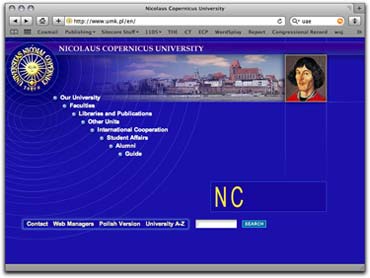Polish University Centralizes Campus Wireless with Meru Equipment
- By Dian Schaffhauser
- 03/02/09
Nicolaus Copernicus University in Torun, Poland is replacing stand-alone wireless access points(APs) on its campus with a centrally controlled wireless network. Theuniversity, known in Polish as Uniwersytet Miko_aja Kopernika (UMK), is usingequipment Meru Networks to provide secure wireless Internet access.
"The university'snetwork has around 400 users a day and more than 2,000 regular users amonth," said Tomasz Wolniewicz, director of information and communicationstechnology. "We needed a network that would give access to that number ofstudents without breaks in service."
The university, which hasabout 40,000 students, had deployed about 90 stand-alone wireless APs from 3Comsince 2005 to cover open access areas such as libraries, halls, and cafeterias.Since then, laptop use has grown rapidly, and wireless access has doubled inthe last year alone, with new arrivals placing heavy demands on the network."We can get up to 40 new users every day," said Wolniewicz. "Theold network was not able to cope. Users were noticing breaks in service of upto several seconds when they would roam the campus and their laptops switchedbetween one access point and another."
Additionally, the universitywas unsure whether the legacy network would support new applications, such asvoice over wireless IP. So last year the institution decided to upgrade itswireless LAN infrastructure. It tested equipment from Meru, Cisco, Aruba, Trapeze Networks, 3Com, and Siemens, and in particular measuredhandoff, the break in transmission when a client moves from one AP to another."In our tests, the Meru system eliminated this break," said Wolniewicz.These results are being shared with other universities through the Polishacademic network consortium Pionier.
Currently, the university'sWLAN covers various academic departments as well as the library andadministration buildings. The network uses 65 Meru AP200 access pointssupporting the IEEE 802.11a/b/g standards and an MC3000 controller, whichprovides centralized management. The Meru network is being supplied by theKonsorcjum FEN in cooperation with its partner Poltel.
UMK's network was the firstin Poland to connect to the international secure eduroam system, which providesuser authentication for wireless LANs in educational establishments acrossEurope.
About the Author
Dian Schaffhauser is a former senior contributing editor for 1105 Media's education publications THE Journal, Campus Technology and Spaces4Learning.